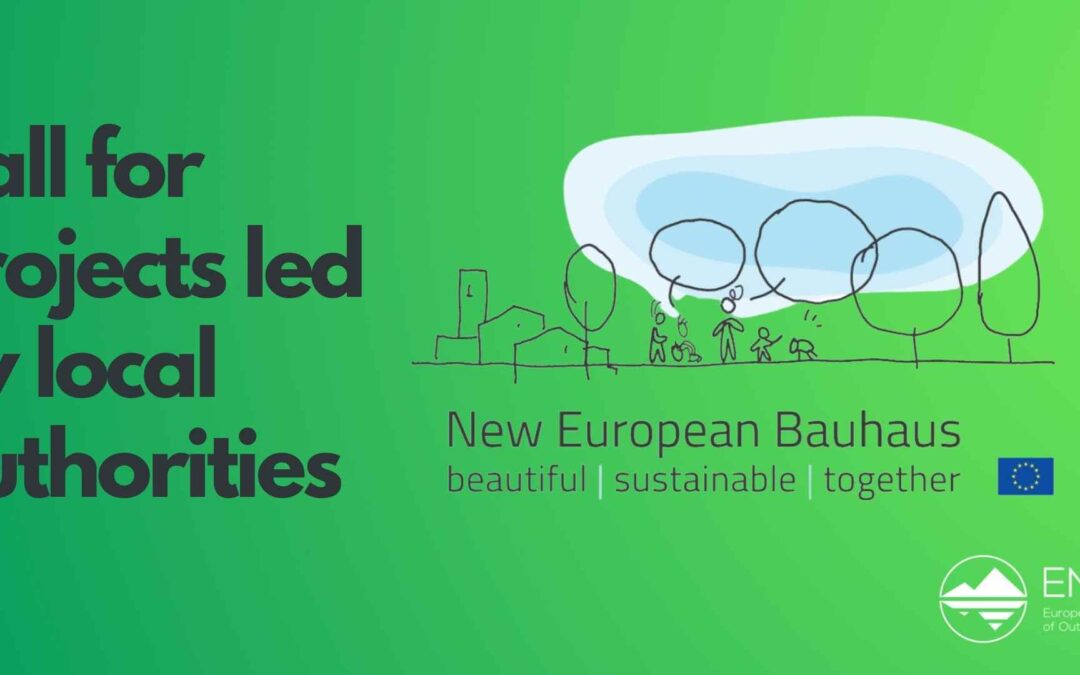On April 30th, the Commission announced a specific call to support smaller municipalities people to develop local New European Bauhaus projects with their communities and make the New European Bauhaus (NEB) a reality on the ground. The support is intended specifically for citizens, cities and towns to take the New European Bauhaus project deep into their communities.
What is The New European Bauhaus?
The New European Bauhaus is an environmental, economic and cultural project, aiming to combine design, sustainability, accessibility, affordability and investment in order to help deliver the European Green Deal.
Launched by President von der Leyen in her 2020 State of the Union address, the New European Bauhaus was co-designed together with thousands of people and organisations across Europe and further beyond.
The New European Bauhaus initiative is a creative and interdisciplinary initiative that connects the European Green Deal to our living spaces and experiences. It calls on all of us to imagine and build together a sustainable and inclusive future that is beautiful for our eyes, minds, and souls. Beautiful are the places, practices, and experiences that are:
- Enriching, inspired by art and culture, responding to needs beyond functionality.
- Sustainable, in harmony with nature, the environment, and our planet.
- Inclusive, encouraging a dialogue across cultures, disciplines, genders and ages.
Support to New European Bauhaus Local Initiatives
The third and last call, ‘Support to New European Bauhaus Local Initiatives’, provides technical assistance to small and medium-sized municipalities (up to 100 000 habitants), which do not have the capacity or rich expertise needed to turn their NEB project ideas into reality. 20 place-based project concepts selected within the call will benefit from tailored support on the ground provided by a group of interdisciplinary experts to shape the concepts along the lines of the New European Bauhaus and the objectives of the Green Deal. Support from cohesion policy is thus intended to help introduce a place-based approach to NEB initiatives at the regional and local level, and to engage public authorities in the Member States to launch more New European Bauhaus projects nationally.
Four action areas
Specifically, the NEB is promoting projects led by local public authorities and contributing to the New European Bauhaus in the following four action areas:
- Renovation of existing buildings and public spaces in a spirit of circularity and carbon neutrality;
- Preservation and transformation of cultural heritage;
- Adaptation and transformation of buildings for affordable housing solutions;
- Regeneration of urban or rural spaces.
——————–
20 place-based projects will be selected to receive
up to 75 days of in-kind support by interdisciplinary experts
via a Technical Assistance Programme operated by the European Commission
——————–
The programme includes:
Needs assessment: Experts will perform an assessment of the specific needs of the envisaged New European Bauhaus project and develop technical assistance plans with tailored support.
Support services: Experts will provide state-of-the-art project development and planning, stakeholder engagement (e.g., stakeholder mapping, citizen engagement) and technical advice (e.g., cost estimates, financing strategies, legal advice), according to the needs identified.
Implementation roadmap: Experts will support the beneficiaries in the incubation of the project towards a detailed roadmap that will guide and enable the implementation of their idea.
Why should the outdoor sports participate to the call and get involved?
The outdoor sports sector and the Bauhaus initiative have a mutual interest in urban regeneration, social cohesion and active, healthy communities. The following topics clearly link the benefits of Outdoor sports with the objectives of the New European Bauhaus.
Physical health and mental wellbeing through green spaces: the findings from the BOSS project has provided evidence that correlates exercise in green spaces to improvements in physical health and especially mental well-being is now very significant. While there is clear evidence that increased fitness and better cardiovascular function, reduced blood pressure, obesity, resting heart rate and a positive influence on other health markers are all associated with physical activity – but the evidence now shows that participants gain greater benefits from exercising in green space. Research has further shown that exercise in green spaces generates positive effects for mood, resilience, feelings of revitalisation, positive engagement and restoration for people living in urban settings. Negative affective states like stress, depression, anxiety, tension, confusion, anger, rumination, loneliness and neuroticism could be reduced by exercise in green space.
Environmental awareness and connections: in the transition towards a greener economy, the awareness of our human dependence on nature and biodiversity is of significant importance. Europe’s level of urbanisation reached 75% of its population and is expected to increase to approximately 83.7% by 2050.Therefore, the development of beautiful and accessible natural areas in our urban settings is becoming increasingly important by creating greater opportunity for citizens to connect with nature in their daily routines and experience its benefits.
Active spaces: sustainable and aesthetic places of living can successfully incorporate a rethinking and redevelopment of spatial planning, thus to maximise individuals’ possibility to move in any moment of their daily routines. The concept of ‘active spaces’ is increasingly being applied in cities across Europe, transforming local communal space in order to help to decrease sedentarism and increase the health and wellbeing of citizens.
Social inclusion through active spaces: the concept of active spaces makes use of built environments in a smart way (buildings and green spaces) in order to provide equal access for all, regardless of income category, social or cultural status or physical condition: wellbeing through movement should be accessible to all in a clean, sustainable and beautiful future.
Green Playspaces – open to community-driven initiatives: rethinking our shared spaces is also about creating the conditions for bottom-up initiatives and allowing activities to take place out in the open. Sport and physical activity are excellent ways to do this, mixing communities and creating new interpretations of existing places with very limited risk of tensions that arise with the appropriation of public spaces for private interests.
Toolbox for future projects
The knowledge and lessons learnt during this process will feed into a ‘toolbox’ aimed at other municipalities as well as the wider public interested in developing new or replicating existing New European Bauhaus projects on the ground. The European Regional Development Fund funds the technical assistance to municipalities. This can take the form of tailor-made methodological, technical, regulatory, financial and socio-economic expertise provided by the expert team on the ground that will support further development of project concepts by the municipalities, as well a toolbox for future project owners. The deadline for submissions is 23 May 2022 at 17:00 CEST.
Any question regarding the call?
Need some guidance? Would like to test an ideas? Please get in touch with Benjamin Billet benjamin.billet@outdoor-sports-network.eu
Support to New European Bauhaus Local Initiatives Call website

